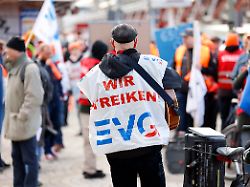Fear of wage-price spiral
Will the mega strike fuel inflation?
By Hannes Vogel
03/27/2023 5:24 p.m
In view of skyrocketing prices, unions are demanding more money for employees across the board. Some economists fear that this will set off a vicious circle that could stifle growth and paralyze the economy.
Nothing works anymore: With their warning strike in the transport sector, the Verdi and EVG unions paralyzed large parts of public life throughout Germany. Deutsche Bahn has stopped long-distance traffic, there are no regional trains in seven federal states, and many airports are closed. The mega strike in the transport industry has added a bitter certainty to the frustration of millions of commuters and travelers: Inflation is solidifying and could become a permanent problem.
Stationary trains, buses and planes are a visible sign that a wave of higher wage agreements may soon be rolling through the country due to rising prices. According to the Federal Statistical Office, inflation last year was 7.9 percent. And in order to regain the lost purchasing power of their employees, unions are now demanding significantly more money across the board.
In the collective bargaining for the public sector at federal and local level, where Verdi and EVG want to exert pressure with today’s traffic strike, the unions want to get 10.5 percent or at least 500 euros more for the employees. According to Verdi, Deutsche Post has promised wage increases of up to 16.1 percent for most of its employees; ballots on the offer will run until the end of March. Verdi is currently negotiating for employees in the paper, cardboard and plastics processing industry, the energy industry as well as banks and insurance companies. The new collective bargaining round will also start soon in retail. And at Lufthansa (over 5 percent), Condor (7 to 9 percent), the seaports (9.4 percent) and DHL (8.6 percent), Verdi had already pushed through significant wage increases last year.
Price pressure from the trade union house
As unproblematic as these catch-up effects were in times of moderate price increases in recent years, they can become just as dangerous when inflation is exploding. Because then there is a greater risk that galloping prices and wages will continue to drive each other up until there is an uncontrollable wage-price spiral. The danger arises above all when the trade unions overdo it for fear of future price increases and wage demands exceed actual inflation.
This vicious circle is difficult to prove empirically, which is why the assessments of the experts differ widely. DIW boss Marcel Fratzscher considers it a “myth”. The economist Martin Werding from the Ruhr University Bochum admits that “inflation is increasingly affecting the economy as a whole”. But: “So far, in our opinion, this has not resulted in a spiral.” ECB boss Christine Lagarde also sees no wage-price spiral. However, the monetary watchdogs are expecting wage growth in the next few quarters that will be very strong by historical standards.
Bundesbank boss Joachim Nagel, on the other hand, is concerned that the dreaded wage-price spiral may have already set in and warns that “the wage agreements currently being negotiated in Germany are generally not compatible with medium-term price stability in the euro area”. He also sees “signs of second-round effects of inflation-related higher wage increases on prices” – in other words, indications that wages and prices are already heating each other up. And Hagen Lesch from the Institute of German Economics (IW), which is close to employers, even urges the collective bargaining parties to “concert a wage-price spiral in a concerted manner.”
A political battlefield
The current situation is also explosive because structural changes on the labor market could strengthen the power of the trade unions and thus encourage the emergence of a wage-price spiral. “The times of an employer market in which employers could more or less dictate wages and working conditions seem to be over,” says DIW boss Fratzscher. There are already two million vacancies in Germany today and a huge shortage of skilled workers, which will only increase in the next ten years. I expect a significant increase in labor disputes in Germany in the coming years.”
In these collective bargaining conflicts, the wage-price spiral becomes a political battleground. Fearing hyperinflation triggered by unions, employers are trying to attack the legitimacy of the wage demands: “We will feel it if the wage agreement is too high,” says BDA chief executive Steffen Kampeter. “Nobody will get out of this strike unscathed”. And the unions are trying to downplay the risk: “If I put all our demands together, then we’re asking for less than the actual inflation. It’s nonsense to talk about a wage-price spiral here,” says Verdi boss Frank Werneke. According to Verdi, many employers would only tell “the fairy tale of the wage-price spiral” in order to shirk their responsibility.
The fact is that there is plenty of catching up to do: last year, negotiated wages rose by 2.2 percent, much more slowly than consumer prices. The economists do expect inflation to fall, but this year it will still average 6.6 percent. Only in 2024 is it expected to drop noticeably to 3 percent. An uncontrollable hyperinflation is not yet imminent.
